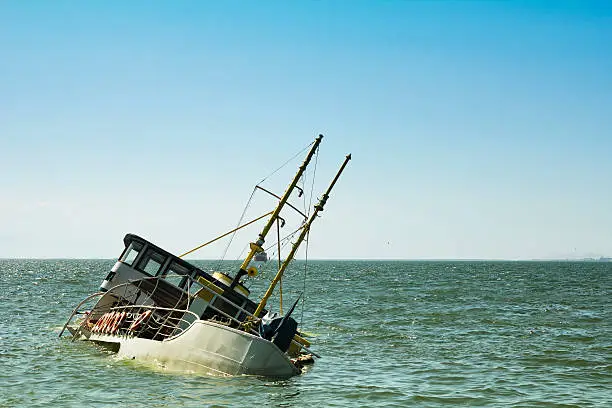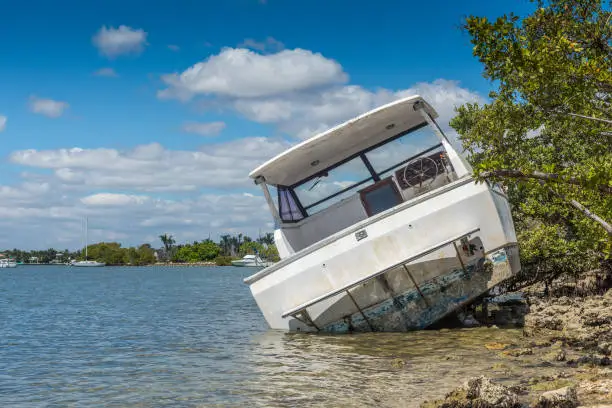Boat accidents can be unexpected and distressing events for any boat owner or operator. Whether it’s a collision, grounding, storm damage, theft, or another unforeseen incident, the aftermath of a boat accident can be overwhelming.
One crucial aspect of owning a boat is having the right insurance coverage in place to protect against such mishaps. Understanding the process of filing boat insurance claims after an accident is essential to navigate the situation effectively and ensure a smooth recovery for your vessel.

Boat Accident Insurance: Understanding the Basics
Boat accident insurance, commonly known as marine insurance, serves as a protective shield for boat owners against a spectrum of potential risks and damages associated with their vessels. This specialized insurance is crafted to offer comprehensive coverage, encompassing diverse scenarios that can impact a boat and its owner.
Primarily, boat accident insurance provides coverage for physical damage incurred by the boat itself. This includes damages from collisions, storms, theft, vandalism, or any other unforeseen incidents that could harm the vessel. This coverage ensures that the costs of repairing or replacing the boat due to such damages are mitigated.
Moreover, the insurance extends beyond the boat itself, encompassing liability coverage. In the unfortunate event of an accident where the boat owner is deemed responsible for injuries to others or damage to their property, liability coverage steps in. It assists in bearing the financial burdens arising from legal claims, medical expenses, or property repair or replacement costs.
Boat accident insurance also includes provisions for medical payments, addressing injuries sustained by individuals on board. It helps cover medical expenses resulting from accidents on the boat, regardless of fault, thereby providing a layer of financial support for medical treatment and recovery.
Furthermore, the policy often incorporates coverage for accessories and equipment essential for the boat’s operation and enjoyment. This aspect ensures that additional items such as navigation equipment, fishing gear, or personal belongings on the boat are protected against damage, theft, or loss.
The specifics of coverage provided by boat accident insurance can significantly vary based on the policy terms, insurance company, and additional options chosen by the boat owner. Understanding the breadth and limitations of this coverage is vital in securing comprehensive protection for both the boat and its owner in the face of unforeseen accidents and liabilities.
Filing Boat Insurance Claims: Steps to Take After an Accident
- Prioritize Safety: In the event of a boat accident, the safety of everyone on board is paramount. Attend to any injuries and ensure everyone is safe. Take immediate action to prevent further damage by stopping the boat’s engine or securing it in a safe position.
- Record the Incident: Compile as much data as you can regarding the mishap. Take photographs or videos of the damage sustained by your boat, other vessels involved, and the surrounding area. Note down the date, time, location, and weather conditions, and gather contact information from any witnesses. Full documentation of the incident is vital when filing an insurance claim.
- Notify the Authorities: Depending on the severity of the accident and local regulations, contact the relevant authorities such as the Coast Guard or local law enforcement. Filing an accident report may be necessary and can serve as vital evidence when filing your boat insurance claim.
- Get in touch with Your Insurance Provider: Tell your insurance provider about the accident as soon as possible. Most policies specify a timeframe within which claims should be reported. Provide the necessary details about the incident and follow their instructions for filing a claim. Be prepared to provide the documentation and evidence collected at the accident scene.
- Understanding Boat Damage Coverage: Familiarize yourself with the specifics of your boat insurance coverage. This includes understanding the types of damage covered, deductibles, limits, and any additional coverage options. Knowing the extent of your coverage will help manage expectations regarding reimbursement for damages.
- Assessment and Inspection: The insurance company will likely conduct an assessment or send a claims adjuster to inspect the damage to your boat. This assessment helps in estimating the cost of repairs or determining the extent of the loss. Cooperate with the insurance company throughout this process and provide any additional information required.
- Filing the Claim: Work closely with your insurance provider to complete the necessary paperwork for filing the claim. To substantiate your claim, include precise details and supporting documentation. Being transparent and truthful throughout the process can help avoid delays or complications.
- Repairing the Boat: Once the insurance claim is approved, you can proceed with repairing the boat. Depending on your policy terms, you may have the choice of selecting a repair shop or contractor. Keep detailed records of all expenses related to repairs for reimbursement purposes.
- Follow-Up and Resolution: Maintain communication with your insurance company during the repair process. Ensure the repairs are carried out satisfactorily and in line with the insurer’s guidelines. Verify the completed work and ensure your boat is restored to its pre-accident condition.
Conclusion:
Navigating boat insurance claims after an accident involves a series of crucial steps, from ensuring safety and documenting the incident to filing the claim and overseeing the repair process. Understanding the details of your boat insurance policy and promptly following the necessary procedures can significantly streamline the process of recovering from a boat accident.
In summary, prioritizing safety, gathering evidence, promptly notifying authorities and your insurance provider, understanding coverage specifics, actively participating in the claims process, and ensuring thorough documentation are key elements in effectively managing boat insurance claims after an unfortunate accident.
By being well-prepared and informed, you can navigate the post-accident process with greater ease, facilitating a smoother recovery for both you and your vessel. At G&G Independent Insurance, we’re here to help you through the boat insurance claims process. Please get in touch with us if you have any queries or require expert guidance.


